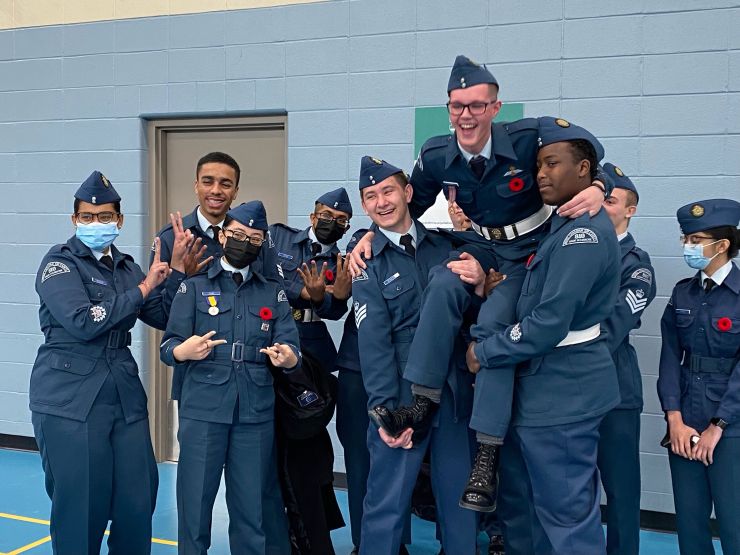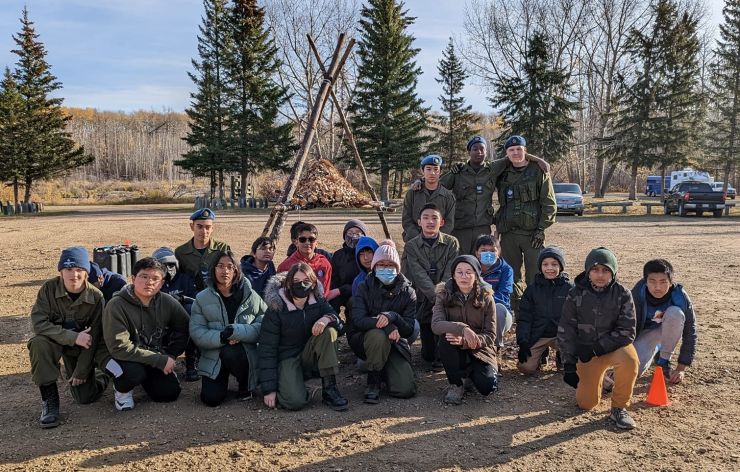What Is The Air Cadet Program?The Royal Canadian Air Cadets is a dynamic and structured youth program sponsored by the Department of National Defense and the Air Cadet League of Canada. It is designed for young Canadians aged 12-18 years who want to participate in challenging, rewarding, and fun activities while learning valuable skills such as teamwork, leadership, citizenship, and discipline. Cadets are motivated to excel at physical fitness, at their academic studies, and at giving back to their communities through volunteering. The program shapes well-rounded, community-minded, experienced young people who are ready to become tomorrow’s leaders. The three aims of the air cadet program are to:
|
|
| Cadets are not members of the Canadian Forces, nor are they expected to join. Cadets is an opportunity to learn more about Canada, make new friends, and develop valuable life skills like leadership, citizenship, and responsibility. | |
 |
WHAT MAKES 810 UNIQUE?With a rich history of over 50 years, 810 Grant McConachie Squadron has molded hundreds of Alberta youth into future leaders by offering a wide range of training opportunities. You will find a welcoming environment led by a skilled group of staff, senior cadets, and volunteers.
|
What Activities Do You Do?
You will learn how to stand at attention, march, salute, and identify ranks. Since you’re an air cadet, you will learn about theory of flight, navigation, aircraft identification, meteorology, and radio communication. Each year, we go on survival exercises/camping trips. We go flying in small, single-engine aircraft as well as gliders (small, engine-less aircraft that are pulled in the air by another plane). Some other activities we do include touring military bases, participating in parades, rifle shooting, traveling, and meeting cadets from other squadrons. Over the summer, you can go to summer camp and meet cadets from across Canada. When you’re old enough, you can apply for a scholarship to obtain your glider pilot’s license or your power pilot’s license.
What Are The Costs?
There is no cost associated with joining. The uniforms and basic training are funded by the Department of National Defense. Additional activities are funded by the Air Cadet League of Canada, and our sponsoring committee “Guardians of 810 Air Cadet Squadron Society” (Guardians of 810 Society).The Guardians are a group of parent volunteers who fundraise and support the squadron’s activities.
It costs at least $1700.00 per cadet to run the program. Since you incur no costs, all this money must be raised to pay for activities throughout the year, such as flying and gliding. Cadets and their families are expected to participate in fundraising to support activities.
What Do I Wear?
All cadets wear the Royal Canadian Air Cadet uniform. The Department of National Defense loans you the uniform at no cost. All badges and uniform parts are provided. You are expected to take good care of your uniform and return it when you leave the squadron. You may be responsible to pay for lost or damaged uniform parts. If you need to exchange uniform parts, talk to your flight commander.
Until you receive a uniform, wear black dress pants, a white dress shirt, and a tie. After you have been at cadets a minimum of three weeks and all your paperwork has been processed, you will be called by the Supply Officer to be sized. If we have your sizes, you will get your uniform right away. Otherwise, it will be ordered for you. Please be patient and wait for the Supply Officer to contact you.
Your uniform will be inspected each parade night. The senior cadets will teach you how to properly care for and clean your uniform so you have sharp creases, shiny boots, and no wrinkles or lint.
When Does The Squadron Meet?
Cadet training begins in September and ends in June. 810 Squadron has its mandatory training nights on Wednesdays from 6:15pm to 9:30pm at Allendale School. These are the nights that all cadets must attend and wear their uniforms. Cadets participate in a parade and complete their mandatory training. Parents and family are invited to watch the opening and closing parades.
The squadron also meets on Saturdays, Sundays, and Mondays for optional and complementary training. These include band, sports, drill team, flag party, aviation ground school, and many more. Weekends are typically more relaxed depending on what activity we are doing.
Sometimes, the squadron will hold mandatory training activities away from the school. These are required to pass your training level. For example, you must attend weekend Training Workshops, the Battle of Britain parade, the Remembrance Day parade, the survival exercises, the bottle drive, and the Annual Ceremonial Review at the end of the year. We will give you plenty of notice before these events.
Cadets are encouraged to participate in as many activities and optional training as they can. Those who participate are more likely to be rewarded with awards, promotions, and summer camps. Attendance is taken at all cadet activities.
How is The Squadron Run?
The squadron is administered by officers from the Cadet Instructors Cadre, a branch of the Canadian Forces Reserve. Their role is to lead, instruct, and run cadet squadrons. Because they are employed by the Canadian Forces on a part-time basis, most of them have full-time jobs or go to school. Much of the work they do with cadets is voluntary. They are helped by Civilian Volunteers (CIV) such as parents, former cadets, and ex-military people.
We rely on the squadron sponsoring committee, the Guardians of 810 Society. The Guardians are comprised of a group of dedicated parents and guardians, who volunteer their time to fundraise and support cadet activities.
At its core, the program is led by cadets. Throughout their careers, cadets gain the experience and skills to lead the squadron and organize activities. They then pass down their knowledge to the junior cadets, who will one day take over the squadron.
